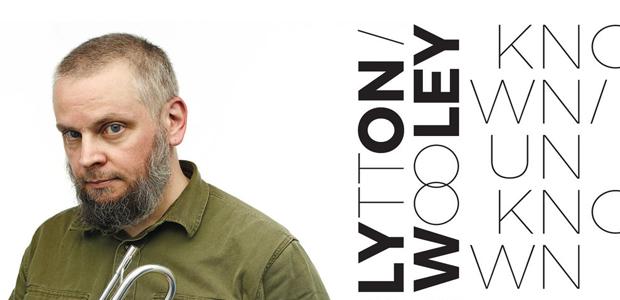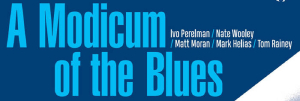I've just found a new kind of engagement with the trumpet - interview with Nate Wooley

How was the last year for you?
Nate Wooley: It was equal parts difficult and exciting. I won't even talk about personal ups and downs, or anything relating to the anxiety caused by living in America at the moment. Purely musically, it was a year of making some important decisions that entailed some growing pains as well as a renewed sense excitement about the possibilities of being a musician and an artist right now.
What you've done and what you've expected to do?
NW: The big achievement for me last year was releasing Columbia Icefield. This was the first time I felt like I was able to get something compositionally fully formed out into the world in the exact way I wanted. It balanced composition and improvisation in the right way for me and I was happy that it seemed like people got that and were interested in that piece and that band. Beyond that, last year was really about preparing some large projects that will be released to the public in 2020, including a double quartet chamber project called Mutual Aid Music that blurs the lines between the, experimental music, contemporary classical and jazz traditions of improvising/indeterminacy and features Ingrid Laubrock, Matt Moran, Sylvie Courvoisier, Josh Modney, Mariel Roberts, Cory Smythe, and Russell Greenberg. I also put on and recorded the sixth version of my long song-cycle Seven Storey Mountain in the fall, which has a 32 person ensemble and, to me at least, is the best one we've done. All of that will come out in 2020. Beyond that, I've just found a new kind of engagement with the trumpet as a technical machine, studying more traditional technique alongside some new ways for me to think of the horn in my compositional and improvisational playing.
What albums and concerts made a big impression on you? If there were any... Or maybe you were mindblowed by other artists and not only musicians.
NW: I don't go out as much as I should to see music. I have some social anxiety that keeps me in the house unless I really have to be out, but I was able to see a new piece for Yarn/Wire by Annea Lockwood that was incredible, as well as taking part in a performance of Sarah Hennies'es Fleas that still has me ringing in a weird way. Someone floated me the new Streifenjunko record, Eivind I think, and that got listened to a lot, but mostly it's been a year of rediscovering older music that knocked me out a long time ago and I'm now returning to with more mature ears: a lot of Monteverdi and Bach cantatas and a lot of Jurassic 5 and Alvin Lucier.
It's interesting that you ask about non-musicians. I think that gets overlooked a lot in favor of the direct lineage between players. This year was big for the films of Bruno Dumont and reading a lot of Franco Moretti and Henri Lefebvre, both of whom have been on my mind a ton and a short but powerful pull toward Agnes Martin at the beginning of the year that definitely affected a lot of the music I was making, compositionally and in improvising.
You've recorded a bunch of interesting albums last year. One of my favourite is "Standwal” by From Wolves To Whales. Could you explain the main idea of this recording and how did it happen that you released it?
NW: Well, with that, it's pretty standard. From Wolves to Whales is a band that originally began as a conversation between Dave Rempis and I, although the amount of work Dave has put into it really means he deserves the credit for making it happen. We wanted to work together and recorded our first album Wolves to Whales in New York a couple of years ago and found that every time we played it could just go in different directions. One of the things I love about that band, actually, is that we have all noticeably grown and changed musically since the last time we played, and no one is afraid to assert weird new ideas into the group, trusting that the listening of everyone is deep and wide enough to deal with it. It's one of the great purely improvising situations I'm in at this point.
The group went on tour after that first recording came out and two of the shows were recorded. Strandwal happened in Holland and there was one in Belgium as well. We liked all the music and it just seemed easy to get those out, the first on Dave's label and the second on Dropa Disc.
You've worked last year a lot with Ivo Perelman. How is to work with him?
NW: Fast! Ivo comes into town a couple times a year and records everything in one big push. I think the records that came out with him in this last batch were recorded within a week of each other and he did others in between. It's a very easy and relaxed process. We play and decide what works and what doesn't after. Typically it's easy enough to do the playing that it's first takes of pieces without a lot to cut out for the record.
And how is to record and work with Matthew Shipp? You've worked with him on two albums - I mean "What If?" and "Strings 4" led by Ivo Perelman.
NW: I grew up with Matt as a part of my life. When I lived in Denver, my friend and I would be CDs every Saturday and sit and listen....we didn’t have much money but could find sales and get one or two each. There was almost always something by Matt in there (and William Parker and Joe Morris especially) and so when i first got to meet Matt at a show we did in Philadelphia based on improvising and new music (I played Kenneth Gaburo and a solo piece, he played a solo piece based on Boulez) it was an incredible honor and felt like I was finally getting to know someone I'd been around for years. The recordings, especially the new duo, are challenging in a really great way. Matt has such a specific and personal language, but you can't just put it on autopilot because he's so creative that he's constantly keeping you focused on the way the music's unfolding and where he's going and what his responses are to what you're playing are totally unique. I love playing with Matt and I hope we can do some more duo soon, or with Ivo!
What is Sound American? Is it still active?
NW: Sound American is a music journal I started in 2014 or so. The idea was to find a way of talking about music that wasn't coming from a critical/academic or a purely promotional viewpoint. So, it features musicians talking about music in plain language whenever possible and there are no promotions or CD reviews involved. Every issue is centered on a topic and the hope is to give as much to the person that is absolutely new to experimental music as well as the super fan or student. It's still very much active and its 23rd issue (now in print and online) will be out in a couple of weeks. It's gone from me doing it all by myself to now having a lot of amazing people like Ken Vandermark, Matana Roberts, Zeena Parkins, David Grubbs, Luke Stewart, Chris Pitsiokos, Charmaine Lee etc etc involved as an editorial and advisory board. I think the issues are really broad now and the best work that's been done on the journal in years.
We can read on Sound American website that music is for everyone. Is the improvised music also for everyone and why?
NW: Of course it is. Why would anyone not want any form of expression to not be available to everyone? It doesn't mean they have to like it, but that's not the question. The question is if improvised music (or experimental or contemporary composition or electronic or dubstep or trap or whatever) holds something that can move, touch, motivate or inspire a human being. I think anyone proposing that there is a music that doesn't have the potential in it somewhere to do that to every person in some way is attempting to create a moat around that music, elevating it to a place that elitist. This happens all the time, of course, but I think the motivation behind that is false and selfish.
There will be a new record by label Fundacja Sluchaj!. Could you describe how did it happen that you've made "Known/Unknown" with Paul Lytton?
NW: Paul and I have worked together for almost ten years now. He was one of my first and now is my longest collaborator. We've released three other recordings as the duo and been on a number of things where we work as the 'rhythm section' (our term for it) for someone else. It had been awhile since we'd made a real studio recording in which I could play the amplifier and Paul could get out from behind the drum set and work with smaller percussion and electronics. I have a close friend and collaborator in Dusseldorf that makes very good site recordings and he agreed to get us into a big garage and make a new record one afternoon, as Paul lives close and I had some days off in between other projects. As in every other recording we've done, the music turned out to be as close to alien as I've ever heard. This one, especially, pushes the boundaries in every possible way and I'm really incredibly proud of it. I got lucky in that Maciej from Sluchaj wrote to see if I had anything that needed at home and he'll be putting it out in time for us to do a small tour in March, partially with Ken Vandermark.
How is to work with Paul Lytton, who is from different generation than you?
NW: Working with Paul has been one of the most generative and formative experiences of my musical life. Musically our collaboration has opened me up and forced me to look at new ways of approaching my instrument and space and dialogue, but he's also become a model of someone that doesn't just work from a developed language over and over again. He's constantly thinking and experimenting, now almost 70 years old, still looking for entirely new ways to approach improvising and music as a philosophy. He's an inspiration in that way. I remember the first gig we ever did on the first tour. He got in the car after and said 'now, we never play that way again. Every night should be completely different'. I was scared to death! 10 nights still to go and every night had to be different?! It was an amazing trial by fire and I came out of it with a deeper understanding of what he was going for and with more strength and confidence to push myself without worrying about success, only the process. Over the years, Paul and I have become close. I used to say he was like a second father. That still holds true, but in the last few years I'd say he's deeper than that. He's one of my best friends.
- Aby wysyłać odpowiedzi, należy się zalogować.







